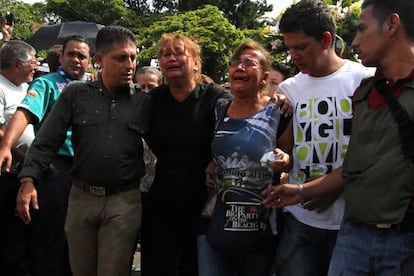Venezuelan students vow to hit the streets to protest the ongoing violence
Situation remains tense following the shooting death of a 14-year-old by police at a rally

Venezuelan students announced that they will take to the streets in different major cities in the coming days to protest the shooting death of a 14-year-old demonstrator by police and the ongoing violence in the country.
Demonstrations were held on Wednesday throughout the country, including Caracas, where a large group gathered in front of the Interior Ministry.
The Nicolás Maduro administration has condemned the shooting of Kluvier Roa, a student who had reportedly joined a demonstration in San Cristóbal, Táchira state, after school. The youth died on the way to the hospital.
A 23-year-old officer with the Bolivarian National Police has been arrested and charged with shooting Roa in the head.
In the past few weeks, at least five other youths have died from gunshot wounds to the head in different parts of the country, but it is unclear whether the incidents were politically motivated.
Hasler Iglesias, a student leader at Venezuela’s Central University (UCV), the most important higher education center in the nation, said that students across the country will begin a new round of protest rallies against the government of President Maduro.
“We are not going to say where the protests will begin because we know that this government will come after us,” said Iglesias, who was recently elected student leader at UCV.
Maduro has assured that “armed repression is prohibited in Venezuela.”
On Tuesday, Iglesias and his supporters marched to the Interior and Justice Ministry to demand that the government revoke a military resolution introduced some weeks ago that allows security forces to use lethal force at demonstrations and public meetings.
Maduro has assured that “armed repression is prohibited in Venezuela.”
Also on Tuesday, Gaby Arellano, an up-and-coming youth leader and member of the opposition People’s Will (VP) party headed by jailed leader Leopoldo López, said she would organize a march for the mothers of the students in front of the papal nuncio’s offices in Caracas. She invited López’s wife Lilian Tintori to join the demonstration.
Other youth leaders from opposition factions headed by suspended Deputy Marina Corina Machado and Caracas Mayor Antonio Ledezma, who was arrested last week after Maduro accused him of plotting a coup, have begun collecting signatures for the national transition manifesto.
That document, originally signed by Machado, López and Ledezma, is considered by Maduro to be evidence that the opposition is planning to overthrow his government.
In February 2014, students in San Cristóbal and Mérida ignited the flames that set off a wave of violent protests that quickly spread across the country and lasted for two and a half months. The official death toll from those protests was 43, with hundreds of people injured in clashes between government security forces and demonstrators.
Last year, there were 24,980 murders committed in Venezuela, the second most violent country in the world
López is currently on trial for sedition and vandalism stemming from the anti-government protest in Caracas on February 12. International groups, including the United Nations, have called for his immediate release.
This time the students said their upcoming demonstrations and marches are geared to pressure the government to do something about the street violence and murders that take place every day in Venezuela.
Venezuela is the second most violent country in the world after Honduras.
Last year, there were 24,980 homicides in the country, whose population is 30 million, according to the Venezuelan Observatory on Violence. An average of 68 homicides were committed each day with a rate of 82 per 100,000 inhabitants.
On Wednesday, José Miguel Insulza, the secretary general of the Organization of American States (OAS), condemned Roa’s murder and the rampant violence in Venezuela. He asked the government to hold an open dialogue with the opposition.
Tu suscripción se está usando en otro dispositivo
¿Quieres añadir otro usuario a tu suscripción?
Si continúas leyendo en este dispositivo, no se podrá leer en el otro.
FlechaTu suscripción se está usando en otro dispositivo y solo puedes acceder a EL PAÍS desde un dispositivo a la vez.
Si quieres compartir tu cuenta, cambia tu suscripción a la modalidad Premium, así podrás añadir otro usuario. Cada uno accederá con su propia cuenta de email, lo que os permitirá personalizar vuestra experiencia en EL PAÍS.
En el caso de no saber quién está usando tu cuenta, te recomendamos cambiar tu contraseña aquí.
Si decides continuar compartiendo tu cuenta, este mensaje se mostrará en tu dispositivo y en el de la otra persona que está usando tu cuenta de forma indefinida, afectando a tu experiencia de lectura. Puedes consultar aquí los términos y condiciones de la suscripción digital.








































